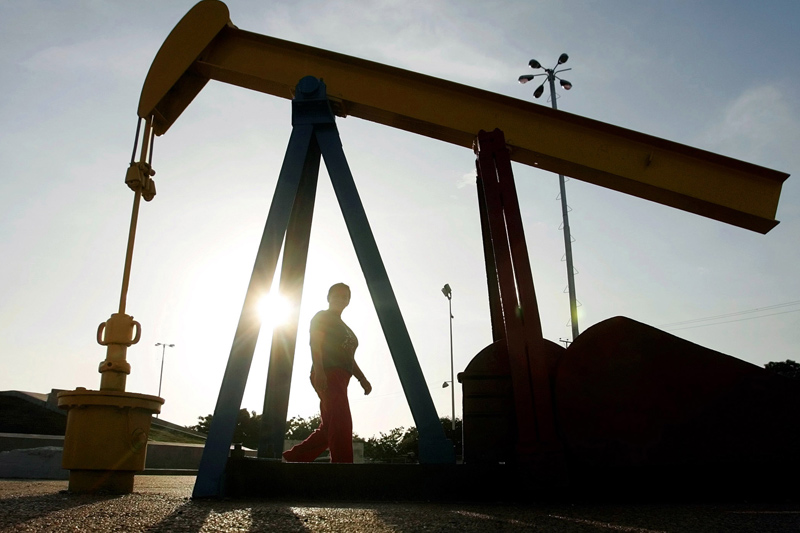Investing.com - Crude oil futures fell in Asian trading on Wednesday as talks broke down among Greek political parties to form a coalition government, which opened the door for new elections and possibly a Greek exit from the currency bloc.
Talk that U.S. stockpiles will continue rising also pressured the commodity downwards.
On the New York Mercantile Exchange, light, sweet crude futures for delivery in June traded at USD93.41 a barrel, down 0.61%, off from a session high of USD93.44 and up from an earlier session low of USD93.03.
In Greece, political parties were unable to patch together a coalition government earlier, with fears brewing the country is headed for a new round of elections, where parties opposed to austerity measures may take the upper hand and tout policies that will mean an end to bailout money and possibly an end to membership in the eurozone.
Meanwhile in the U.S., the American Petroleum Institute, an industry group, reported that U.S. inventories rose 6.6 million barrels last week, and concerns the U.S. Department of Energy's inventory data set for release later this week will show similar gains pushed prices down as well.
The market shrugged off reasonably healthy data out of the U.S.
Headline U.S. consumer prices, including food and energy costs, came in flat in April, while core consumer prices, which are stripped of volatile food and energy prices, rose 0.2% in April, in line with expectations,
A Federal Reserve Bank of New York manufacturing activity index for the New York area jumped to 17.1 in May from 6.6 in April, far outpacing market calls for an 8.5 reading.
Gross domestic product in Germany, Europe's largest economy, grew by a seasonally adjusted 0.5% in the first quarter of 2012 from the previous quarter, above expectations for growth of 0.1%.
Year-on-year GDP growth came to 1.7%, outpacing expectations for 0.8% expansion.
The eurozone as a whole avoided a recession in the first quarter, with quarter-on-quarter GDP growth coming in flat, defying expectations for a contraction of 0.2%.
The eurozone economy contracted by 0.3% in the fourth quarter of 2011.
Fears that a Greek implosion will disrupt the European economy kept oil prices lower, however.
On the ICE Futures Exchange, Brent oil futures for July delivery were down 0.13% and trading at USD110.79 a barrel, up USD17.38 from its U.S. counterpart.
Talk that U.S. stockpiles will continue rising also pressured the commodity downwards.
On the New York Mercantile Exchange, light, sweet crude futures for delivery in June traded at USD93.41 a barrel, down 0.61%, off from a session high of USD93.44 and up from an earlier session low of USD93.03.
In Greece, political parties were unable to patch together a coalition government earlier, with fears brewing the country is headed for a new round of elections, where parties opposed to austerity measures may take the upper hand and tout policies that will mean an end to bailout money and possibly an end to membership in the eurozone.
Meanwhile in the U.S., the American Petroleum Institute, an industry group, reported that U.S. inventories rose 6.6 million barrels last week, and concerns the U.S. Department of Energy's inventory data set for release later this week will show similar gains pushed prices down as well.
The market shrugged off reasonably healthy data out of the U.S.
Headline U.S. consumer prices, including food and energy costs, came in flat in April, while core consumer prices, which are stripped of volatile food and energy prices, rose 0.2% in April, in line with expectations,
A Federal Reserve Bank of New York manufacturing activity index for the New York area jumped to 17.1 in May from 6.6 in April, far outpacing market calls for an 8.5 reading.
Gross domestic product in Germany, Europe's largest economy, grew by a seasonally adjusted 0.5% in the first quarter of 2012 from the previous quarter, above expectations for growth of 0.1%.
Year-on-year GDP growth came to 1.7%, outpacing expectations for 0.8% expansion.
The eurozone as a whole avoided a recession in the first quarter, with quarter-on-quarter GDP growth coming in flat, defying expectations for a contraction of 0.2%.
The eurozone economy contracted by 0.3% in the fourth quarter of 2011.
Fears that a Greek implosion will disrupt the European economy kept oil prices lower, however.
On the ICE Futures Exchange, Brent oil futures for July delivery were down 0.13% and trading at USD110.79 a barrel, up USD17.38 from its U.S. counterpart.
